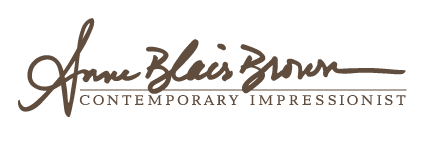“No problem can be solved from the same level of consciousness that created it.” ~ Albert Einstein
How does the above quotation apply to painting? Painting is full of problem solving. For me most of that mental work comes at the start. For years, I have tended to begin my paintings in the same general manner, which is massing in shapes and values in one dark tone and wiping out lights. This method has really worked for me and is what I teach. Recently, though, I have been exploring new starts. If I want to grow as an artist and give a new freshness to my work, it doesn’t make sense to approach each painting the same way every time.
In the painting above, I started in a rather classical way (instead of my normal loosey-goosey-shape-y-no-lines massing). I stained the canvas in a light ochre color and drew an outline of the scene with a small, pointy brush. Not groundbreaking by any stretch, but nonetheless a departure for me. Full disclosure, I have recently watched a classically trained painter begin in this tried and true way and thought it would be fun to get back to basic drawing. The funny part was that since I am the big-wonky-brush-lady I had to scour my studio for a small brush.
The painting above is also 100% acrylic. Another departure from my norm. I know, I know…acrylics are plastic-y, right? I beg to differ. I love the thicker strokes on top of the flat here. The only difference I feel with acrylics vs. oils is that I have to spritz the acrylics with water occasionally. Other than that, I still use a variety of #8-12 Hog Bristle Flats and Filberts just like with oils. I still load up my brush for chunkier passages. I still leave a little under-painting showing through the strokes. The best thing about acrylics, too, is the fast drying time. This really helps with plein air painting and travel.
I like the way this painting turned out, and I think the ease with which I painted it (believe me, that doesn’t always happen!) was because of simply switching gears. That put me in a place of exploration and play. Changing up my process here and there is keeping it interesting, varied, and adding a little bit of challenge, allowing me to problem solve from a different level of consciousness….(see what I did there?). By keeping my work exciting to me, it is bound to reflect in the work I put out in the world.
Working from a place of unfamiliarity can be a scary but wonderful thing. If you have not yet found your “art groove”, by all means follow a process that teaches you to get consistent results. But, the minute you get comfortable, switch lanes for a while. You might discover something delightfully unexpected.

